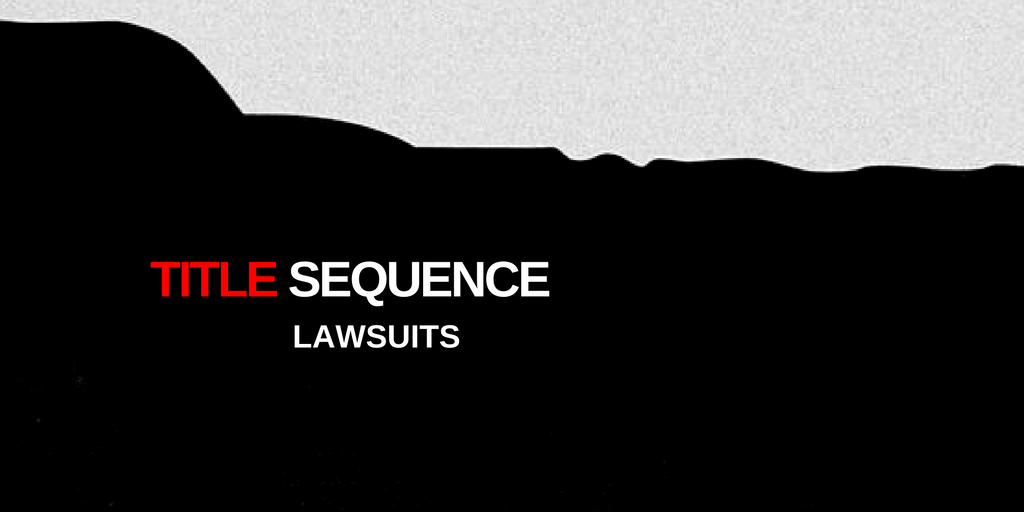 HOW TO AVOID LAWSUITS OVER CREDIT SEQUENCES
HOW TO AVOID LAWSUITS OVER CREDIT SEQUENCES
As a film and TV industry professional, you may consider title sequences to be the fun part of your projects, an opportunity to present a bit of an artistic appetizer prior to the onset of the main course. Undoubtedly this can be true, but as you may have read recently, the title sequence can be fraught with potential for costly lawsuits.
The art of the title sequence can be a fun and artistically fulfilling part of the post-production process. In fact, there are websites that celebrate the most beloved credit sequences like The Fresh Prince of Bel-Air.
{Let’s pause for a moment and take in the feelings of the opening credits: the colors, the graffiti, the slapstick. }
It feels good to look back at those memories, doesn’t it?
For all of those cheery stories about amazing credit sequences, there are just as many stories about lawsuits over credit sequences.
Break a Promise? Get Sued.

Good Kill, bad credit sequence.
Recently, a California appeals court has shot down a lawsuit filed by film producer Mark Amin over unfair treatment in the credit sequence for Good Kill, a film about drone warfare starring Ethan Hawke.
The Hollywood Reporter explains, “Amin, an executive producer on Frida and other Oscar- and Emmy-nominated works, sued Voltage Pictures in May 2015 with the allegation that he was promised “gold standard” treatment, and instead his name was buried as a producer of Good Kill “in a greatly inferior position at the bottom of a card headed by two of the defendants’ executives.”
In September 2015, a Los Angeles Superior Court judge advanced Amin’s contract and fraud lawsuit over Voltage’s First Amendment objection that Amin was attempting to interfere with its exercise of free speech in connection with an issue of public interest.”
In a surprise turn of events, California Court of Appeals Justice Elizabeth Grimes later reversed the ruling. As a result, Amin’s Sobini Films loses the lawsuit and will have to pay attorney fees and costs.
Readers can read the full decision here. Sadly, this type of lawsuit is not unusual.
Title TV Sequences Are Also Under Scrutiny
In 2013, The Hollywood Reporter shared that, “Gita Hall May has settled a lawsuit against Lionsgate Entertainment for briefly showing her during the opening credits of AMC’s Mad Men.
The 79-year-old ex-model filed the lawsuit in March, alleging her image from a Richard Avedon photograph shot more than half a century ago was used without her permission.
The photo was for an early-’60s Revlon ad, and May said that she had never consented “to allow, forty years later, her image to be cropped from the photo, in secret, and inserted as a key element in the title sequence of a cable television series.”
Penguin Film Gets Ice Cold Lawsuit
Sadly, a friendly group project can quickly turn ugly after the film moves to distribution. Early this year, a cinematographer who photographed March of the Penguins was filing a lawsuit in the

Who’s your director? Title sequence controversy.
French courts seeking recognition as co-director of the film. As shared in the IDA, “The producers countered with accusations that this was just a technician being greedy, looking for extra money now that the film was so successful. They scoffed at the idea that Laurent Chalet should share co-authorship credit.”
The Balance Between Law and Creative Expression
To create one of the best title sequences ever, it’s imperative you balance artistic freedom with the avoidance of legal landmines.
Keep reading to discover how to protect yourself when it comes to title sequences.
Get Legal Help to Protect You
Do you want just to focus on what you do best instead of figuring out confusing legal requirements?
Well, you are not alone.
Yes, we know production lawsuits always happen to other production companies. But one day, it will happen to you. Lawsuits endanger your film, your reputation, and your budget.
And that means if you make films or TV shows, you’re in line for a potential nasty lawsuit. What can you do to protect yourself in advance?
Title Sequence Help!
When it comes to clearing title sequences, the best approach is to acquire a full attorney review of clearance procedures. A seasoned entertainment attorney will view your finished film or television project while cross checking it against your legal documents to ensure you have every necessary agreement, with the proper language, in place to protect what you will distribute to the public.
When you do all you can to protect yourself and your project, you can move into distribution with confidence.

